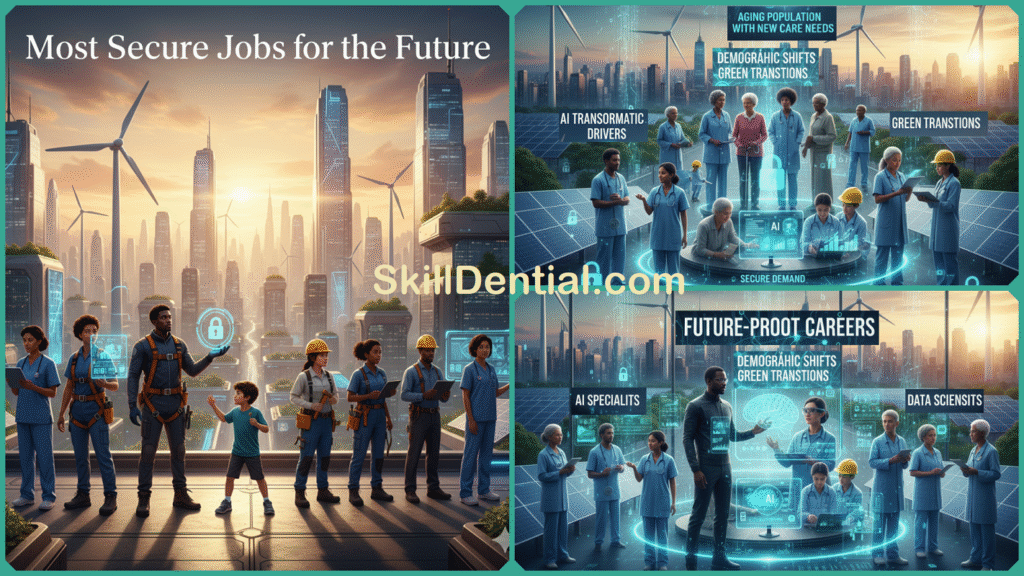In an era marked by rapid technological advancements, automation, and economic shifts, concerns about long-term career stability are more relevant than ever. Whether you are a student deciding on a major, a professional contemplating a career change, or a parent guiding the next generation, understanding the most secure jobs for the future is crucial.
The Most Secure Jobs for the Future not only provide a high level of stability but also offer significant potential for career growth, increased job satisfaction, and a strong resistance to being replaced or automated by technology. These roles are likely to remain relevant and valuable as the job market continues to evolve.

This blog post offers a comprehensive and detailed exploration of these future-proof careers, giving you valuable insights that will assist you in making well-informed and thoughtful decisions. By understanding these career paths deeply, you can confidently secure your professional future and ensure long-term stability and success for many years to come.
What Makes a Job Secure for the Future?
Secure jobs for the future share several important and defining key characteristics that make them highly resilient and adaptable in an era marked by rapid technological advancements and significant economic transformation.
These roles generally provide a strong sense of stability and security, even as various industries undergo significant changes and as new, cutting-edge technologies continue to emerge on the horizon.
- First and foremost, these jobs require uniquely human skills—such as empathy, creativity, critical thinking, and complex decision-making—that machines and AI cannot replicate. These human-centric abilities give individuals a competitive advantage because they complement technology rather than compete against it.
- Secondly, secure jobs typically involve technologies that assist and enhance human work, instead of replacing it altogether. For example, roles in artificial intelligence, cybersecurity, and data science rely on humans to design, interpret, and govern the technology itself, requiring a blend of technical fluency and judgment.
- Another defining trait of secure jobs is their alignment with growing and essential economic sectors. Fields like healthcare, green energy, education, and cybersecurity are expanding in response to demographic trends, environmental imperatives, and digital transformation, making careers in these industries more stable.
Additionally, jobs that adapt to evolving societal needs—such as aging populations, mental health awareness, and sustainability—tend to maintain long-term relevance. These roles require empathy, social intelligence, and ethical judgment, qualities that are intrinsically human and resistant to automation.
Finally, a secure job for the future often demands adaptability and lifelong learning. With nearly 40% of core workplace skills expected to shift by 2030, ongoing upskilling and reskilling are critical. Individuals who combine technical skills with soft skills like resilience, communication, and leadership are best positioned to thrive in the future workplace.
In Summary
What truly makes a job secure for the future is a thoughtful combination of several critical factors, including strong technical expertise, uniquely human skills that machines cannot replicate, alignment with rapidly growing and evolving sectors, adaptability to ongoing societal changes, and a steadfast commitment to continuous learning and personal development.
This carefully balanced mix of qualities ensures that workers remain indispensable and valuable contributors in a world that is increasingly shaped by intelligent machines, advanced technology, and rapid innovation across all industries and fields.
Current Trends Impacting Job Security
Current trends that are significantly impacting job security revolve primarily around rapid technological innovations, particularly advancements in artificial intelligence (AI), as well as ongoing demographic shifts and critical environmental changes that are actively reshaping economic demands and labor market dynamics.
AI is transforming the workplace by both displacing and augmenting jobs. Roles that involve clerical, routine, and middle-management tasks are at the highest risk of automation. For instance, entry-level white-collar jobs such as data entry and administrative support face strong displacement pressure as AI automates repetitive processes.
Several reports from 2025 forecast that by 2030, between 12%-14% of workers may need to transition to new types of jobs due to AI-driven automation. Notably, while AI displaces some roles, it simultaneously creates new opportunities in fields focused on AI ethics, oversight, data science, cybersecurity, and human-AI collaboration. This dual impact underscores the importance of reskilling and lifelong learning to maintain job security.
Demographic changes also play a critical role. Aging populations around the world increase demand for healthcare professionals, social workers, and other care-related services that require human empathy and judgment—attributes difficult to replicate by machines. This trend ensures continuing growth and security in the healthcare and social services sectors.
Moreover, the global emphasis on sustainability fuels demand for jobs in green energy, environmental science, and sustainable infrastructure development. Governments and industries investing in renewable energy and climate initiatives are generating secure employment opportunities in these areas.
In summary, the current key trends that are significantly shaping and influencing job security across various industries and sectors include the following important factors:
- AI-driven automation is displacing routine jobs but creating new tech and oversight roles.
- The need for continuous reskilling to adapt to AI-enhanced work environments.
- Growing demand for healthcare and social services due to aging populations.
- Expansion of green energy and sustainability-focused jobs driven by climate action.
Individuals who concentrate on acquiring future-proof human skills while strategically aligning themselves with these rapidly expanding and evolving sectors are positioned to gain the most secure and stable jobs available in the future job market.
Top Most Secure Jobs for the Future
Peace of mind truly begins with having a stable and reliable career. Although certain industries are currently experiencing a decline, many others are expanding rapidly, presenting a future-proof pathway for individuals who possess the right set of skills and qualifications. In this evolving job market, it’s crucial to focus on roles that offer not only financial security but also long-term relevance.
Here, we present the top 11 most secure jobs for the future—careers that promise more than just a steady paycheck; they offer lasting stability and significance in an increasingly unpredictable and ever-changing world.
Artificial Intelligence (AI) and Machine Learning Specialists
AI adoption is rapidly expanding at an accelerating pace across a wide range of sectors, including healthcare, finance, and logistics, transforming how these industries operate and deliver services. Specialists who design and develop AI systems and complex algorithms continue to be in exceptionally high demand, driven by the increasing reliance on intelligent technologies.
These professionals benefit from competitive salaries, excellent job growth prospects, and are projected to be among the fastest-growing roles within the technology sector over the coming years.
Healthcare Professionals
Jobs such as nurse practitioners, surgeons, anesthesiologists, mental health counselors, and physical therapists rank among the most secure career options available today, largely due to the rapidly growing aging population that requires ongoing medical care and support.
Additionally, the essential need for human empathy and professional judgment in these fields makes them irreplaceable by automation or technology. These roles are not only stable but are also expanding significantly as telehealth services continue to grow, providing greater access to healthcare remotely.
Furthermore, increasing awareness and prioritization of mental health have led to a surge in demand for mental health counselors and related professionals, further solidifying the long-term security and importance of these occupations in the healthcare industry.
Cybersecurity Analysts
The rapid rise of digital transformation significantly elevates the critical need for robust cyber protection measures across all industries. Cybersecurity analysts who specialize in key areas such as intrusion detection, incident response, and cryptography play an absolutely essential role in safeguarding sensitive data and maintaining system integrity.
This particular field has become one of the fastest-growing technology roles worldwide, largely driven by the ever-increasing number and sophistication of cyber threats targeting businesses and organizations.
Data Scientists and Analysts
Data scientists play a crucial role in enabling data-driven decision-making processes by skillfully combining expertise in statistics, programming, and specialized domain knowledge. Their ability to analyze and interpret complex data sets makes them invaluable in a wide range of industries, from marketing and finance to healthcare and technology.
The demand for skilled data scientists is rapidly increasing as organizations face the growing complexity and volume of digital data, requiring advanced analytical techniques to extract meaningful insights and support strategic decisions.
Cloud Solutions Architects
As more and more businesses transition to cloud platforms, architects who specialize in designing scalable and secure cloud infrastructures find themselves in exceptionally high demand and enjoy strong job security.
These professionals play a crucial role that demands not only advanced technical skills but also a deep strategic understanding of business objectives and goals. Their expertise ensures that cloud solutions are both efficient and aligned with the broader business vision.
Green Energy Technicians and Specialists
Careers in renewable energy, including roles such as solar and wind technicians, environmental engineers, and sustainable building specialists, are experiencing significant growth driven by increasing climate action priorities around the globe.
The rapid expansion of investment in green infrastructure projects is not only helping to combat climate change but is also creating a steadily growing number of job opportunities that offer promising long-term job security and career stability for professionals in this sector.
Education Professionals and Trainers
STEM and vocational education roles have remained remarkably stable over time, largely because teaching these subjects requires a significant amount of direct human interaction and the ability to adapt to diverse learning needs. The nature of these fields demands hands-on guidance and personalized support, which technology alone cannot fully replace.
Additionally, the rise of online education has significantly expanded career opportunities for professionals such as instructional designers and e-learning specialists, who play a crucial role in creating engaging and effective digital learning experiences. These experts are increasingly in demand as educational institutions and organizations continue to adopt and integrate innovative e-learning platforms and tools.
Skilled Tradespeople
Electricians, plumbers, and construction workers continue to be in steady and ongoing demand as a direct result of rapid urbanization and continuous infrastructure development. These essential roles are crucial for building and maintaining our cities and communities, and they face a very low risk of being replaced by automation or artificial intelligence in the foreseeable future.
Because of this unique advantage, they provide reliable and stable career pathways that not only ensure long-term employment potential but also offer numerous opportunities for continuous skill advancement and professional growth over time.
Financial Managers and Advisors
Finance professionals who manage investments, assess risks, and handle wealth planning play a crucial role in supporting both overall business operations and personal financial health. Their expertise ensures a steady demand for their services, even as economies fluctuate and change over time.
These professionals play a crucial role in assisting both individuals and organizations as they navigate through increasingly complex and often challenging financial landscapes. By providing expert guidance and insights, they enable their clients to make well-informed decisions that not only address immediate financial concerns but also contribute significantly to achieving long-term stability and sustainable growth over time.
UX/UI Designers
Specialists focused on improving digital product accessibility and enhancing user experience skillfully combine creativity with deep technical knowledge. These professionals play a crucial role in making technology usable for all individuals, including those with disabilities.
Because their work requires a nuanced understanding of human behavior and innovative problem-solving, these roles are much less likely to be automated or replaced by artificial intelligence. As a result, they maintain strong future relevance and continue to be in high demand across various industries.
Social Workers and Community Service Managers
Social workers and community managers play a crucial role in addressing urgent and complex issues related to human welfare, mental health, and social development. Their work depends heavily on a deep understanding of emotional intelligence, empathy, and nuanced interpersonal skills, as well as critical problem-solving abilities that require human judgment and sensitivity.
These essential qualities, along with the deeply personalized care they provide, are fundamental aspects of human interaction that artificial intelligence cannot truly replicate or effectively replace in any meaningful way.
This list is supported by large-scale employer surveys and labor market analyses forecasting a net job growth of 7% or 78 million new roles globally by 2030, with technology, care economy, and green energy sectors leading the way. These jobs combine future-safe human skills, growing sector alignment, and adaptability, making them the most secure options for your career stability and growth.
Salary Comparison of the Most Secure Jobs for the Future
Below is a detailed salary comparison table showcasing the Top 11 Most Secure Jobs for the Future, based on comprehensive data projected for the year 2025 from highly trusted and reputable sources:
| Job Title | Median Salary (USD) | Key Skills / Qualifications | Job Growth Outlook |
|---|---|---|---|
| AI and Machine Learning Specialists | $160,000 – $180,000 | Machine learning frameworks, data modeling | Very High |
| Healthcare Professionals (e.g., Nurse Practitioners, Surgeons) | $125,000 – $450,000+ | Medical degrees, specialization | High (due to aging population) |
| Cybersecurity Analysts | $90,000 – $155,000 | Ethical hacking, cryptography, and incident response | Very High |
| Data Scientists and Analysts | $128,000 – $150,000 | Statistics, programming, data analytics | High |
| Cloud Solutions Architects | $140,000 – $150,000 | Cloud platforms (AWS, Azure), architecture | High |
| Green Energy Technicians and Specialists | $70,000 – $120,000 | Renewable energy tech, environmental science | Growing rapidly |
| Education Professionals and Trainers | $60,000 – $90,000 | Teaching credentials, instructional design | Stable to Growing |
| Skilled Tradespeople | $50,000 – $75,000 | Electrical, plumbing, and construction skills | Stable to Growing |
| Financial Managers and Advisors | $90,000 – $120,000+ | Finance, risk management, investment planning | Steady |
| UX/UI Designers | $80,000 – $110,000 | User experience design, digital tools | Growing |
| Social Workers and Community Service Managers | $50,000 – $70,000 | Social work degrees, counseling skills | Steady to Growing |
Sources indicate many of these careers offer salaries well above the national median, with AI, cybersecurity, healthcare, and data science roles leading in pay and demand due to their central role in the digital and care economies. Skilled trades and education roles provide strong stability with moderate but steady salaries.
Choosing a career path that not only incorporates future-proof skills but also aligns strategically with rapidly growing and evolving sectors will significantly enhance your job security and maximize your earning potential over the next decade and beyond.
FAQs
Why are healthcare jobs considered the most secure?
Healthcare roles require uniquely human qualities such as empathy, judgment, and physical care that technology cannot replicate. Additionally, the aging global population drives growing demand for nurses, doctors, mental health counselors, and therapists. These factors make healthcare careers highly secure and resilient to automation.
Can AI-related jobs be considered secure despite automation fears?
AI specialists are not replaced by automation; rather, they create, maintain, and improve AI systems, making their expertise increasingly valuable. The rapid adoption of AI across industries ensures a continued strong demand for these professionals, requiring ongoing learning to keep skills current.
Are skilled trades still relevant in the future job market?
Skilled trades such as electricians, plumbers, and construction workers involve hands-on problem-solving and physical tasks that are difficult to automate. Urbanization and infrastructure development fuel steady demand, preserving these jobs as essential and secure career paths.
How can I prepare for a career in cybersecurity?
To excel in cybersecurity, build expertise in network security, cryptography, risk assessment, and incident response. Obtaining recognized certifications like CISSP, CompTIA Security+, or CEH can significantly enhance career prospects. This field values analytical thinking, attention to detail, and a proactive mindset.
What skills complement technology to ensure job security?
Job security is strongest when technical skills are combined with human-centered abilities like emotional intelligence, creativity, complex problem-solving, and effective communication. Digital literacy paired with adaptability and lifelong learning forms the foundation for thriving in future work environments influenced by AI and automation.
In Conclusion
Choosing a secure job for the future is fundamentally about aligning one’s career with enduring human values, emerging technologies, and societal priorities. The landscape of the future workforce highlights industries such as healthcare, technology, green energy, skilled trades, and education as prime sectors offering stability and growth.
These Most Secure Jobs for the Future cut across diverse roles—from AI and machine learning specialists to social workers and skilled tradespeople—each playing a crucial role in a changing economy. The key to future-proofing a career lies in developing a hybrid skill set that combines technical expertise with distinctly human abilities such as empathy, creativity, complex problem-solving, and adaptability.
As automation and AI continue to transform workplaces, those who leverage these uniquely human skills alongside digital literacy will thrive. With job creation projected to outpace displacement by emerging technologies, and with continued demographic and environmental shifts driving demand in care and sustainability sectors, individuals and professionals are encouraged to watch and pursue these 11 secure jobs.
This approach not only ensures career longevity but also positions one to contribute meaningfully to a dynamic and evolving labor market. For anyone seeking career stability, growth, and relevance in the coming decades, these secure jobs represent promising and actionable pathways to explore and build upon in 2025 and beyond.
Discover more from SkillDential
Subscribe to get the latest posts sent to your email.


